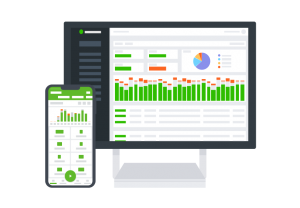How to fully disconnect from work when you’re on vacation

Let’s talk about vacations and how to disconnect from work when you’re on one. More people than ever are feeling burnt out and it’s only getting worse. Everyone’s affected – even the bigwigs. A recent Deloitte study revealed that more than two-thirds of C-level executives are considering a job change to improve their well-being.
Want to get the most out of your time?
Try DeskTime for free!
Try free for 14 days · No credit card required.
By singing up, you agree to our terms and privacy policy.

Whoever you are, a vacation can help abate some of the work stress and anxiety. Vacations let you catch your breath, distance yourself from the daily toil and trouble, and get a fresh perspective on things. Reduced stress, improved mental health, clarity of thought – the mental, physical, and professional benefits of vacations are innumerable.
Of course, that’s only if you disconnect from work.
Unfortunately, most people don’t. A 2021 study by MyPerfectResume showed that 82% of people work while on vacation and 42% intentionally take vacation days to catch up on work. You can’t reduce stress if you take it with you.
Admittedly, completely unplugging from work is difficult. Especially, if you have people depending on you or if your managers play fast and loose with your work-life boundaries. And even when all external factors are fine, people are still prone to push themselves personally be it out of loyalty, diligence, or plain old workaholism.
If you don’t fully disconnect from work, you’re only hurting yourself by pushing yourself closer toward total burnout.
So, let’s look at 7 things you need to do to ensure work doesn’t interrupt your well-deserved rest.
7-step checklist for fully unplugging from work when you’re on vacation
Broadly speaking, the following list consists of two overarching themes – making sure everything’s taken care of when you’re away and minimizing the ways in which you could be pulled back into work.
Let’s break them down and discover how to stop thinking about work on vacation.
1. Inform everyone about vacation plans in advance
Avoid any unwelcome surprises and ensure the team can adequately prepare for your absence by informing all relevant parties about your plans. That includes management, clients, teammates, HR, and anyone else who might be affected by your lack of availability.
Timely planning also ensures vacations don’t overlap between teammates and your company isn’t left shorthanded. If you’ve diligently informed everyone a month or more in advance, don’t forget to remind them once again when your vacation nears.
Note: If you use DeskTime, mark your vacation in the absence calendar so that the entire team is informed about your absence and its reason.
2. Divvy up your responsibilities
Instead of just leaving your tasks and responsibilities up in the air in the hopes that someone takes care of them, it’s a good idea to have a thorough discussion and proper handover with the people who will fill in while you’re gone.
Knowing who’s responsible for what can alleviate any stresses and ensure important work things don’t slip through the cracks. Simply create a list of what needs to be done and assign it to one or several teammates best suited for taking care of them, thus avoiding any misunderstandings or the need to tune in and worry about work during your vacation.
3. Set up your OOO auto-response
A simple, technical, but super important task is to set up your automatic Out Of Office response in your email. This will ensure that anyone who tries to contact you will know not to expect an immediate response or feel offended to be left hanging. A simple text that explains when you’re back and who to contact meanwhile is all you need. You’re welcome to use this OOO email template:
Thanks for reaching out,
I’m currently OOO until [date]. I will get back to you as soon as I return, or if it’s urgent, please contact [colleague’s email].”
It’s also a good idea to indicate your lack of availability on other platforms, e.g. adding a vacation notice on Slack or filling out your DeskTime absence calendar. The goal is to keep everyone informed and help you stop thinking about work on vacation.
4. Leave your work devices at work
Taking your laptop or work phone with you on vacation is never a good idea. It’s a slippery slope: an itch to check in on how things are going can quickly lead to taking care of some small tasks, and before you know it, you’re stuck in an hour-long chat with colleagues seeking your expertise. Not having access to your work devices often means you simply can’t work and that’s one of the best ways how to not think about work on vacation.
In case there’s some important information or particular software on your computer, it’s best to hand it over, along with the necessary permissions, to a trusted colleague so that they can manage everything without your involvement – or, if there’s no other way, with your remote guidance.
5. Delete or sign out of work-related applications
Chances are you have some work-related apps on your personal phone – email, Slack, Skype, LinkedIn, and others. To avoid being constantly pinged by work messages, ongoing work emails, and other notifications, it’s a good idea to delete these apps while you’re away.
If deleting feels like too drastic of a step, then you can simply sign out of each app, but you might have to fight the impulse to log in. Deleting the app creates a bigger barrier and makes it less likely that you’ll be drawn into obsessively checking in with what’s going on at your workplace.

Invite structure in your workday!
Our all-in-one time management solution works wonders.
6. Specify how you can be contacted in emergencies and what constitutes one
Emergencies do happen and there might be some critical things that you’re uniquely qualified to deal with. While you’re well within your rights to cut off all contact with the outside world to switch off from work on your holiday, leaving your colleagues with a way to contact you in emergency situations will be highly appreciated.
That said, you must draw a hard line as to what constitutes an emergency so that people don’t take advantage of your availability. Make it absolutely clear under what circumstances you’re OK to be contacted. This can also help you feel at ease – as long as you don’t receive that emergency call, you can rest easy knowing that your team is on top of things and your involvement isn’t required and stay completely disconnected from work.
7. Set aside a day to catch up with everything for when you return to work
A lot can happen at work while you’re gone, so be prepared ahead of time to spend a day getting back into the flow. Catching up with what’s happened, responding to piled-up emails, and hearing from your team how they managed without you always takes more time than expected, especially if you’ve been away for several weeks.
People often find themselves doing these things on their final vacation days so that they can return full force the moment they step back into their workplace, but take up the final days of their vacation in doing so. Every day matters and, whenever possible, you should leave work stuff for when you’re at work, so you don’t have to worry about it during vacation.
How to disconnect from work? Treat vacations with the respect they deserve
The benefits of vacations are clear, but to take full advantage of them you MUST unplug from work. The sad reality is that most people don’t. As a result, companies and individuals increasingly find themselves dealing with the fallout of rising burnout levels – lower work capacity, lower productivity, and lower motivation.
So take that vacation, and do it properly – take into account all the tips we’ve shared on how to disconnect from work – your long-term career and personal well-being will thank you.
Did you find this article useful? Give it a clap!
Psst! You can clap more than once if you really loved it 🙂